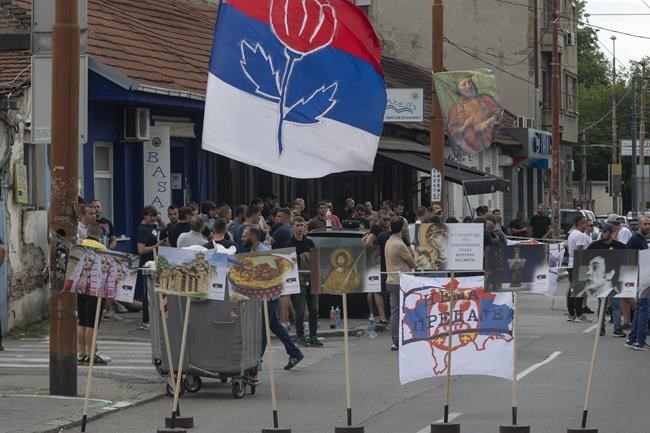
Right-wing extremists gather on a street in central Belgrade, Serbia, Thursday, June 27, 2024. Serbian police on Thursday banned a festival that promotes cultural exchange with Kosovo, in a sign of growing nationalism and government pressure on liberal voices in the Balkan country. The police ban came after several dozen right-wing extremists gathered outside the festival venue, seeking to prevent its holding while waving Serbian flags. (AP Photo/Marko Drobnjakovic)
Republished June 27, 2024 - 11:19 AM
Original Publication Date June 27, 2024 - 7:16 AM
BELGRADE, Serbia (AP) — Serbian police on Thursday banned a festival that promotes cultural exchange with Kosovo in a sign of growing nationalism and government pressure on liberal voices in the Balkan country.
A police statement cited security concerns as the reason to ban the Mirdita, dobar dan event that was due to start later on Thursday in Belgrade with a theater show from Kosovo.
Serbia does not recognize the 2008 declaration of independence by its former province, which is overwhelmingly ethnic Albanian. The Mirdita, dobar dan festival, whose name means “hello” in Albanian and Serbian, is organized by youth groups from Serbia and Kosovo seeking to bridge ethnic divisions created by a 1998-99 war and the postwar tensions.
Organizers in Serbia, the Youth Initiative for Human Rights group, said that Serbian police violated the country's constitution, its own and European laws: “It is a basic duty of the state to secure the rights and freedoms guaranteed by the law and to sanction all those who limit or violate those freedoms and citizens' rights.”
The group added that police did not allow the bus with participants to enter Belgrade and ordered that it return to Kosovo under police escort.
The police ban came after several dozen right-wing extremists gathered outside the festival venue on Thursday, seeking to prevent its holding while waving Serbian flags. Police said they wanted to prevent “danger to the security of people and property and to public peace and order on a larger scale.”
A statement said that the anti-festival gathering is also banned.
Liberal groups criticized the police decision.
“With the ban on ‘Mirdita,’ Serbia and its institutions sided with the hooligans and the deepest ethno-nationalist darkness,” prominent human rights activist Natasa Kandic said on X. “No longer can a debate about reconciliation or a protest against glorification of war criminals be organized in Serbia. A black hole.”
The Movement of Free Citizens party urged the Interior Ministry to revoke the ban also saying the authorities have sided with the extremists who are opposed to regional reconciliation.
Several government officials have sharply criticized the festival in the past several days, describing it as anti-Serb. While the festival has been held alternatively in Serbia and Kosovo for the past decade, this year's ban in Serbia illustrates a general toughening of the government's stance toward its critics.
Earlier this week, authorities banned a Bosnian actor and author from entering Serbia, saying he was a threat to national security, and deported him back to Sarajevo, Bosnia's capital. In the past months, Serbia's independent and investigative journalists have complained of increased legal pressure and threats.
Serbia is formally seeking entry into the European Union but the increasingly authoritarian government of populist President Aleksandar Vucic has steadily drifted away from the EU's pro-democracy values while nurturing close ties with Russia and China.
News from © The Associated Press, 2024